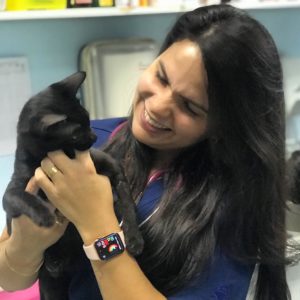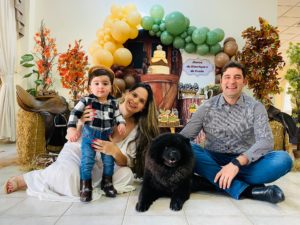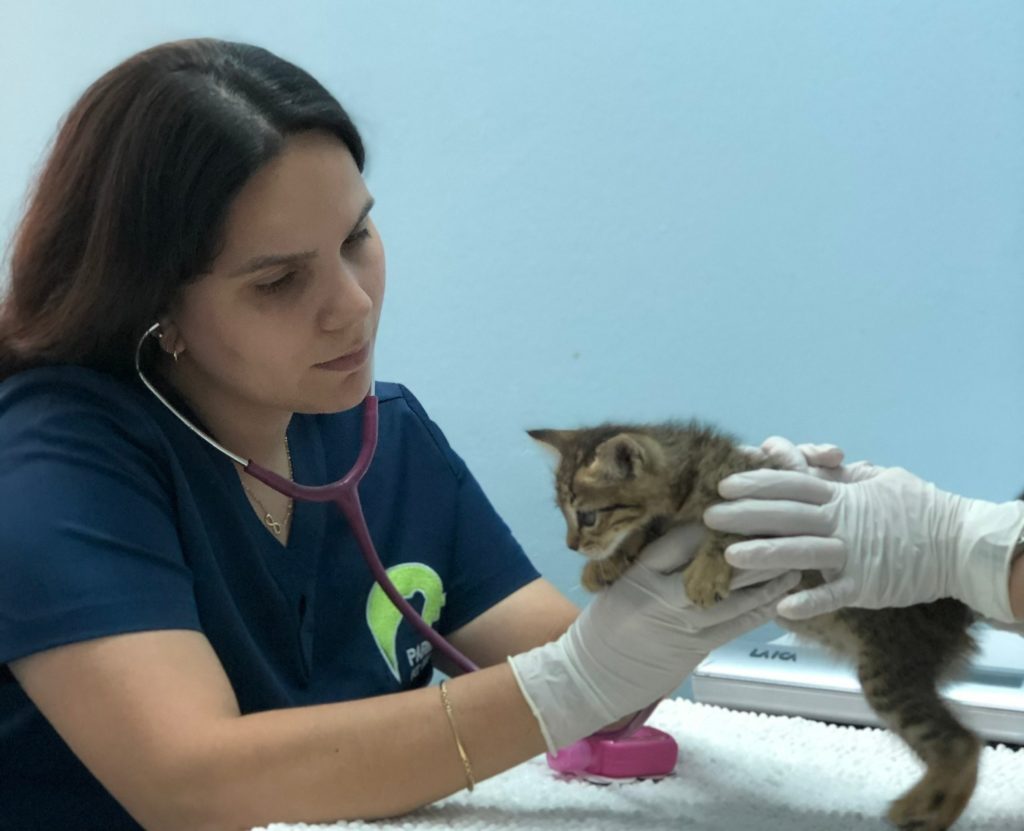São Paulo – Born in Fortaleza, Brazil, 32-year-old Julieta Cavalcante always knew she wanted to be a veterinarian, although her parents wanted her to become a doctor or a lawyer. From an early age, she liked playing with cats but especially with dogs. As an adult, dogs were the main patients she used to treat when she was a veterinarian in Brazil. Upon arriving in Qatar, she was surprised to see there were only cats in her service queue in her first day on the job.
The Qatari have different tastes form Brazilians when it comes to pets. In addition to cats, a small part of the population also domesticates falcons (which can help in hunting), camels and monkeys. Less often dogs are also chosen as pets. But for these animals to be adopted they need to play a role in the house, usually as watchdogs.
The veterinarian didn’t even dream about working in another country, but when her fiancé Paulo Cavalcante (born in Rio Grande do Norte) was invited to work as a veterinarian in a horse farm in Qatar, the plans of the couple, who met in college, needed to change. They decided to get married in court before he moved and so as not to risk both jobs, Julieta stayed in Brazil, while Paulo moved to see if it was a good place to live and work. From August 2018 to January 2019, they lived a long-distance relationship.

When he confirmed the job opportunity was actually good, Paulo came back, married Julieta in the church, and two days later, they were living in another country. Upon arriving in Qatar, she realized that she would have to start studying English again, as she had a very rudimentary knowledge of the language. After a one-year course, even not being fluent, she decided to take an unpaid internship to enter the Qatari labor market.
“At first the adaptation to the language was quite challenging, but I believe the secret is not being scared, as nobody speaks a perfect English here – what matters is getting your point across to the other person. Although challenging, [I saw this opportunity] as a chance to grow. When I look back to when I got here, I see I’ve changed a lot,” Julieta says.
While she did her internship at the Parkview Clinic in Doha, she had to remember what she had learned in college, as she almost didn’t treat cats in Brazil. “When I saw a dog, I already knew what to do, but I did not with cats. I treated many dogs when they showed up in the Brazilian clinic. Today it’s kind of the opposite – I treat so many cats that when a dog comes, I freeze a little,” she said.
After a one-month internship, a job as veterinary assistant opened in the clinic she was working at. But Julieta could only apply to the job if she did three tests (written, practical and oral) to get a veterinarian degree in Qatar. When she passed all three examinations, she started getting paid in September 2019.
Living in Qatar
Paulo had received an invitation to work in Qatar before. Five years earlier, a friend who lived with his wife in the country and worked in horse breeding had called Paulo to work in the clinical area of a farm. But Paulo didn’t want to leave his job as university professor and private veterinarian back then.
But the second time an opportunity arose, he decided to take a risk as he didn’t see a way to grow as a professional where he was working in Brazil. After learning about the salary and working conditions, he talked to Julieta and moved to Qatar.
In his first job in the country, Paulo worked in the clinical part and also helped judging the horses in the farm that would be exhibited. He looked the body, the muzzle and the tail, and if they need an operation, they were sent to a local hospital.
At the beginning of the pandemic, he lost his job, but he received another opportunity in the same week. This time he would treat the racehorses of Qatari emir Tamim bin Hamad Al Thani.
Unlike horses, which have state-of-the-art equipment and great hospitals available, Julieta says, there is still little investment in the treatment of small pets. CT equipment for dogs and cats, which is quite easy to find in Brazil, is only found in other countries like Turkey, Belgium and Italy. Medicine is also hard to find, so a lot must be imported.
To get to a nice financial situation, at first had to work more and give up weekends. Since she arrived in January 2019, she wanted to work as a veterinarian, so she felt fulfilled when she started working 48 hours a week with one day off on Fridays.
“Saturdays and Sundays are business days here. Depending on the day, I used to work from 8 am to 4 pm or 2 pm to 10 pm, but my husband starts working at 2 am and comes back at noon, so we didn’t see each other much back then,” she says.

When they had their first child, Julieta had to adapt her work schedule to be with Henrique, who is now 1 year and 10 months old. As the workload diminished, she started working 6 to 7 hours a day at most, sleeping all nights at home.
Even after adjusting her work schedule, she keeps working on weekends, having only Friday to rest, meet her friends or go out as a family. Notwithstanding the busy routine, she says she doesn’t regret the move, after all this was how she managed to grow as a person and a professional, gained confidence to speak a new language and enjoy a security and living standards her country couldn’t provide her and her family.
In addition to having faced the challenge of the new language, at first she also missed her parents. As an only daughter, she was always by their side. She learned how to live with the distance, but she still misses Brazilian food like rice and beans.
Translated by Guilherme Miranda




